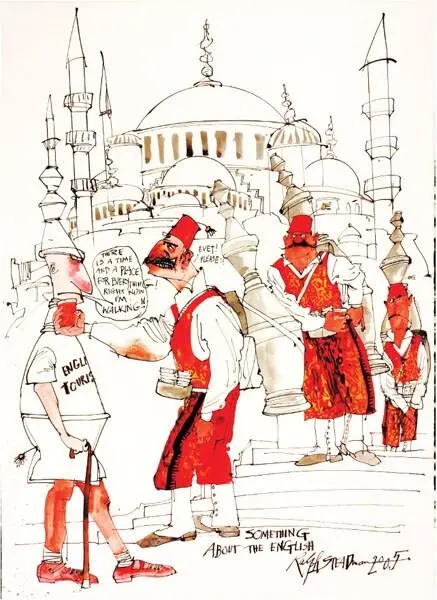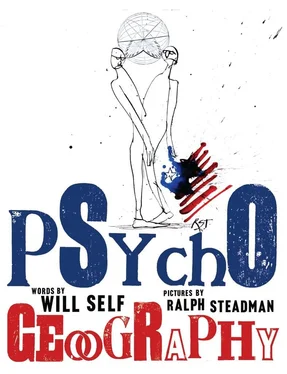
Mow the lawn and, of course, clip the hedges. Mother did try with the garden. She got us kids to dig up a bed and grow nasturtiums, tomato plants and runner beans. She had a chequerboard terrace lain with oblong, concrete slabs; then planted geraniums in the oblong beds. Then she held drinks parties at which she wore a muumuu and served Chianti (this was, after all, the 1970s). By contrast I liked nailing odd bits of wood to the oak tree, hurling rowan berries like grapeshot and digging holes. Bigger and bigger holes, until aged thirteen and heavily under the influence of Terry Jacks’ seminal death ditty ‘Seasons in the Sun’, I dug a hole in the garden so deep that I needed a ladder to descend to the bottom and props to prevent subsidence. I only stopped when I hit the water table — try doing that in a contemporary garden!
In retrospect it wasn’t so much a grave I was trying to dig as an escape tunnel. I wanted out of suburbia so bad it hurt. I wanted to go somewhere — anywhere — where there weren’t so many contentious allotments. I needed money to do this, so I had to go from door to door hawking the only skill I had — gardening. Well, skill is perhaps an overstatement: I could mow lawns and clip hedges, I could weed too, but having been told early on that a weed was only a flower in the wrong place, I subscribed to the view that pretty much everything in the garden should come up forthwith. On the whole the punters were pleased with my services. I suspect they, like me, wanted the geometric lines of their own living rooms ruled on to this obdurate vegetation. However, one man saw fit to express his dissatisfaction (when I’d transformed his head-high rhododendron bush into a squat, black stump) by chasing me down the road wielding the very electric clippers I’d so effectively employed.
None of this is to say that I don’t enjoy a garden — I do. I can even be moved to undertake my own improvements. Living in Oxfordshire in the early 1990s, I felt driven to construct a large fence around the orchard which surrounded our house. I bought fence posts, a sledgehammer, tinkling bundles of wire fencing. I dug, hammered and strung for what seemed like — and in fact were — months. I felt like Levin in Anna Karenina , reconnecting with my sturdy, peasant roots. The aim of the fence was to stop the children getting on to the farm track — but amazingly they contrived somehow to step through the strands of wire. Fiendish little devils. After this fiasco, Levin spent the better part of the winter in his study, experimenting with his seed drill in ways that its manufacturer had not intended.
It’s no messing with Ralph’s Turkish black tea. We spoke yesterday on the phone to catch up after his return from holidaying in a Brutalist concrete block near Antalya. The Great Cham was largely confined — he told me — to the hotel compound by armed guards, where he was compelled to amuse himself by shooting people in the bum with an airgun. He did, however, manage to escape to the bazaar where he bought me an impressive meerschaum pipe carved so as to resemble a Turk’s head (not a kind of knot, you understand — the real thing).
Meerschaum is as Turkish as Kurdish human rights abuses, and large quantities of this hydrous silicate of magnesium are to be found along its coastline. The locals gather up the clayey mass and transform it into smoking instruments shaped like Kemal Atatürk, Jerry Lee Lewis, Iris Murdoch — indeed, just about any personage they take a fancy to. But I digress. It was the tea that gripped me, and Ralph, ever obliging, shot me a packet up by mail and I’m drinking a glass as I write this.
Turkish black tea got me through the whirling of the dervishes during Ramadan in Konya, central Anatolia; just as gallons of milky tchai sustained me on my treks into the Himalaya, and tiny bowls of fragrant green tea kept me chaste among the sex shows of Patpong. In Morocco it’s thé à la menthe , in Belfast it’s earthy Nam Barrie; indeed, I wonder if there’s any region — no matter how hostile — which cannot be braved given the requisite infusion? A cup of tea is both of this world and resolutely out of it; it’s a sideways step into a relaxing realm where time stands still for a few minutes.

The growing ubiquity of coffee is a testimony to the gathering pace of globalisation. The best espresso — say a tiny goblet of black go-go mud in Rome’s Tazze d’Oro — should be belted down, as its name implies, not mulled over; and while coffee preparation and blends may have their regional distinctions, they are being speedily and effectively annihilated by the Republic of Caffeine. Not so tea. We acquire a taste for coffee in late adolescence, when we leave home to join the Family of Man, but tea we imbibe with our mother’s milk.
Or father’s. My own had such a rigid view of his tea ceremonial that he might have been the Confucian sitting under the mulberry tree depicted on the caddy. The pot had to be warmed with boiling water before the leaves were placed in it (leaves — never bags; bags were as alien to him as crack cocaine or pederasty). Milk had to go in the cup before the tea was poured, then three cups were to be drunk — no more, no less. My father swore he could taste the difference if any one of these operations was altered. When I was about seven, he took me to Speakers’ Corner to witness British freedom of speech in action. There were the usual bunch of stepladder orators — Maoists, Bible-huggers, rank crazies — and a most interesting Kenyan gentleman, whose subject was the depredations of imperialism.
‘I tell you,’ the Kenyan proclaimed, ‘when I slaved on the tea estates during the Emergency I did my bit to help my brave brothers in the bush fighting Imperialism, yes I did. Do you want to know what I did?’ Of course we did — we were transfixed. ‘Every single sack of tea that passed through the shed where I worked I pissed in. Yes I did — I pissed in it heartily, satisfied that it would be ending up in your mouths!’ ‘Ahem,’ my father cleared his throat a little uneasily, ‘what an angry chap — don’t believe a word of it, I’m sure he’s fibbing.’
However, I did believe it. Not only that, I grew to consider it one of the shining lights of British democracy, that we could welcome a former subject to our shores and afford him a platform so he could tell us precisely how he’d pissed all over us. What’s more, this nameless Kenyan did more for my appreciation of the significance of world trade than a thousand economics tutorials. I can lift a cup of tea to my lips even now and be pungently reminded of where it comes from.
Which takes us back to Turkey — Istanbul, to be precise — where Ralph was pursued by this tea pedlar with a samovar strapped to his back. Either that’s what it is, or it’s a prototype, steam-powered jet pack. I too have taken to going about the place with tea-making equipment to hand: a camping gas stove, a small kettle, bag, cups and milk. Friends I’m out walking with scoff when I begin to brew up, but once they’re sipping they’re infused with gratitude. After all, nothing beats a good cup of tea save for a chimpanzee dressed up as a world leader.
Deliverance — Doggy Style
Tully, northern Queensland, Australia. The sugar mill belches smoke as thick and flocculent as candyfloss. Along Highway 1 from Innisfail, the narrow-gauge tracks incise the bluey tarmac and serpentine trains heavy with the sweetness of cut cane trundle through the endless fields. Sugar cane — humanity’s biggest crop, weightier than rice and wheat combined. Strange that a world dedicated to producing so much sweetness should nevertheless seem so sour.
Читать дальше














